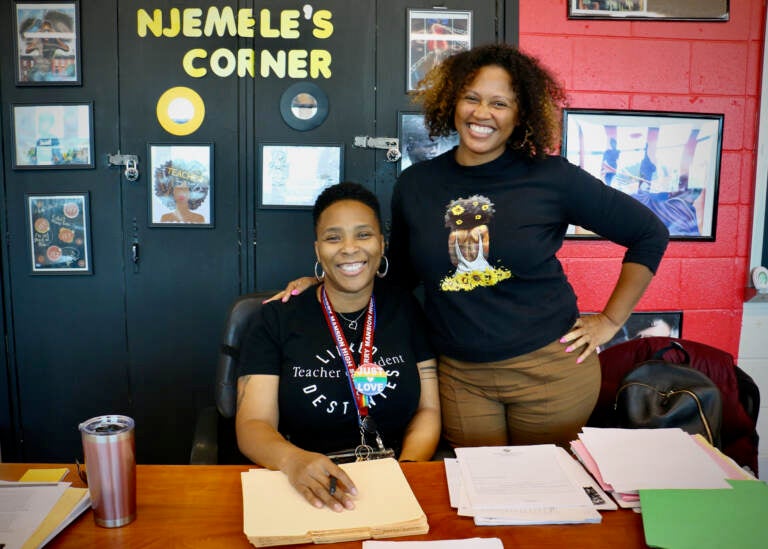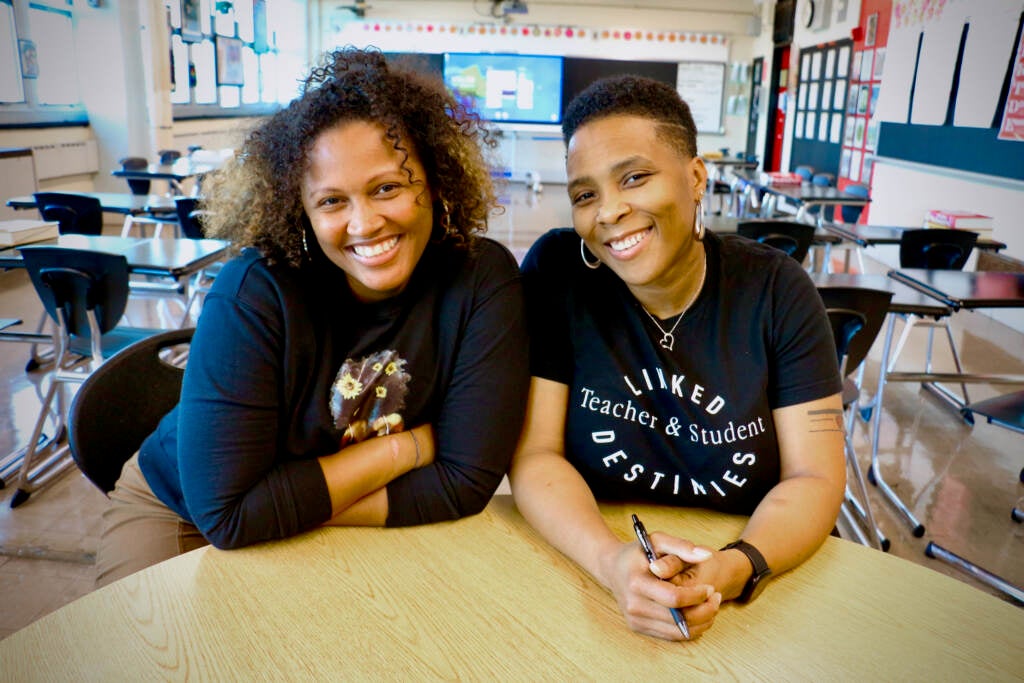This new Philly teacher is grateful to learn the tricks of the trade from her sister-in-law
Being a first-year educator is tough. That’s why new Philly teacher Shalisha Smith is grateful to have a mentor who’s also family.
Listen 4:58
Shalisha Smith (right), a first year teacher in the Philadelphia public schools, rests her hand on the shoulder of her mentor and sister-in-law, Strawberry Mansion High School teacher Njemele Anderson. (Emma Lee/WHYY)
Ask any teacher and they’ll probably tell you their first year in the classroom was the hardest.
That’s why new teacher Shalisha Smith feels lucky to have a trusted mentor already — her sister-in-law and 17-year teaching veteran Njemele Anderson.
“I was not aware of all the planning, the teaching, the grading, start again. I call her in the midst of that dance routine to get more moves because I run out,” said Smith, a teacher at Lincoln High School in Northeast Philadelphia.
Smith laughed, repeating the words “planning,” “teaching,” and “grading” as individual beats, while Anderson, who was next to her, danced in her seat.
The two women have been close friends since Anderson married Smith’s brother, who is also a teacher, almost a decade ago.
Now that they’re both high school English teachers, Smith at Lincoln and Anderson at Strawberry Mansion in North Philly, their phone calls are even more frequent.
Mentors can make a big difference. One federal study found 92% of first-year teachers with mentors returned to the classroom for a second year, compared to 84% without. Mentorship has also been shown to increase teacher satisfaction and improve student achievement.
Like a lot of large districts, the School District of Philadelphia has a mandatory mentoring program for all new teachers, which Smith is taking part in.
Smith, who is 39 and comes from a family of educators, almost majored in teaching, but the program would have kept her in school longer, so she became a social worker instead.

When she had kids a few years ago, she took a job as a receptionist at a high school in Cheltenham in pursuit of a better work-life balance, Smith said. Before long, she was coaching the school’s cheer team and contemplating a career in education.
Anderson, 51, was immediately supportive.
“I am for anyone who wants to do this work pure of heart,” she said, adding that certainly includes her friend and sister-in-law. Anderson also coaches English and history teachers at Strawberry Mansion.
Brian McCracken, Anderson’s principal at Strawberry Mansion, said mentorship is the only way to make sure new teachers have the level of support they need.
“Teaching is the hardest profession and to do it well requires a lot of growth in the beginning,” he said.
McCracken said Anderson’s expertise is obvious in her lessons and interactions with students, and as a result, teachers looking to improve tend to gravitate toward her.
Smith is finishing her master’s in teaching, with her job as a full-time English teacher for the School District of Philadelphia counting as her student teaching. She expects to graduate in the spring.
One of the first problems Smith needed Anderson’s help with was classroom management.
During the first month of school, she asked students to write an origin story for a superhero to practice their creative writing skills. She thought the project would take a few days, but it stretched to a month.
The problem was the students were learning on different levels and at different paces, Smith said, and new students were being added to her classes every day.
With no idea what to do, she called Anderson, who told her to split the students into small groups or “stations” based on how much help they needed.
“Thinking about teaching in that way really changed my planning,” Smith said. “Now when I’m planning, I’m like, ‘OK, what will I do with students that are on each level?’”
While the approach has created more work for Smith on the front end, since she’s effectively teaching three or four groups of students simultaneously, it’s led to fewer setbacks.
Advice from one teacher to another
One of the biggest challenges Smith has faced this semester is student discipline.
“I’m a softy. I have to toughen up a little bit,” she said, trading a knowing glance with Anderson.
Anderson advised Smith to follow what she refers to as “the four Cs”: Be consistent, have consequences, and be consistent with your consequences.
“One thing with young people: They see inconsistencies, so if they think you are not giving someone equal treatment, they’re all over it,” she said.
Anderson said that doesn’t mean she doesn’t have fun with her students. What it does mean is there’s a line in her classroom and students know not to cross it.
“We can bust it up, but when I say this I mean this and not that,” she said. “They understand when they come into the space that I have high expectations.”
Though she’s responsible for holding students accountable as head of the school’s restorative justice program, she said every student gets a clean slate each day.
“They know that at the bottom of all that is that I love them as human beings and I respect their humanity.”
Teaching for the long haul
Fewer people have decided to go into teaching in Pennsylvania in the last decade, resulting in a shortage of qualified educators, though retention also plays a role.
Teacher attrition is a U-shaped curve, meaning educators are more likely to leave within the first few years or much later in their careers as they approach retirement. New teachers leave the profession for a variety of reasons, including low pay, poor preparation, and insufficient support.
“There’s nothing attractive about the curb appeal of this house that we call teaching,” Anderson said.
People who decide to go into teaching are passionate about the work they’re doing, she said, but it can be hard for them to hold onto that enthusiasm in the face of constant challenges.
“The first thing about being a teacher is you are a human being and you have to respect not only your student’s humanity but your own humanity,” Anderson said. “Take care of yourself so you can then be there for your students.”
Both teachers are advocates for work-life balance. They schedule their extra work hours in advance and try not to work in the evenings and on weekends.
“You’re going to end up working overtime, but you shouldn’t be working overtime all the time,” Smith said.
Both women say they’re looking forward to relaxing this holiday season.
Anderson has a trip to Jamaica right before Thanksgiving, and Smith said she’s hoping to have the holiday to herself since her kids should be celebrating with their dad’s family.
“I am thinking about a spa day with some takeout,” she said, laughing. “That sounds like Thanksgiving to me.”
But it wouldn’t be Thanksgiving if they didn’t see one another.
“She’ll come and get a plate at my house,” Anderson said definitively.
Smith agreed: “I sure will.”

Saturdays just got more interesting.
WHYY is your source for fact-based, in-depth journalism and information. As a nonprofit organization, we rely on financial support from readers like you. Please give today.







